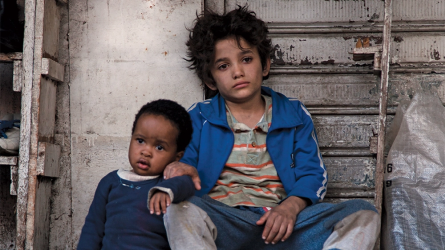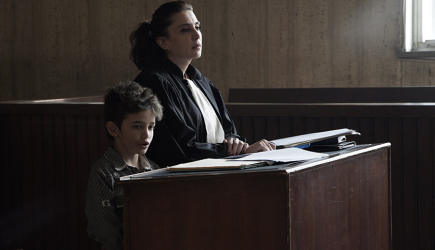I did warn the kids when Trump got elected that we were in store for a lot of bad movies, and that a lot of movies that might be good will torpedo themselves in an effort to take a shot at the President. But even movies that don’t have anything to do with American politics, it occurred to me watching this, will only be made (or distributed) if they fit the desired narrative.
This is probably always true.
And the only relevance to Capernaum (“Chaos”), really, is that it’s a movie about suffering refugees and therefore will get funded and distributed, while a movie about people suffering at the hands of refugees will not.

As a trope, it’s almost as tired as these cute little kids.
This is a good movie about crushing poverty and the tragedy it engenders—one of the many downsides of Academy Award season coinciding with Christmas—which at least has about the happiest ending you could expect for a movie like this.
When we meet our hero Zain, he’s been removed from jail for a trial to sue his parents—for being born. He seems like a kind of nasty, foul-mouthed kid and when the judge asks him if he knows why he was sent to jail, he says it was for “stabbing a sonofabitch”. Fifteen minutes later, we’re mostly left to wonder which of the many deserving sonfabitches he stabbed.
Zain is Lebanese, about 12. Nobody knows how old he is really, because he has no papers and his parents are awful. To me he seemed younger but for the story he must’ve been at least 12 since his younger sister, Sahar, is 11. He adores Sahar, but seems to have no feeling for his other, younger siblings. He works for their landlord who lets the family stay “for free” in the apartment, but he clearly has eyes for Sahar.

11-year-olds, dude.
His mission is to keep Sahar away from the storekeeper, though Sahar likes said storekeeper because he gives her candy and things for free. He realizes she’s had her menses and helps her cover it up, but ultimately loses the battle, and her parents trade Sahar for a couple of chickens.
Infuriated, he runs off, and finds himself wandering the streets, ultimately landing with an Ethiopian woman, Rahil. The Ethiopian woman came to Lebanon to work in a brothel—the amount of human trafficking in this movie is daunting—but quite when she fell in love and got pregnant. But now she’s alone with a one-year-old, Yonas, that she has to hide from her employers, who will send her back if they find out. And again, kind of staggeringly, the hellhole of Lebanon slums is better than Ethiopia.
She’s trying to get enough money for a newer, better fake ID, and Zain ends up watching Yonas while she works. This arrangement works until Rahil doesn’t come home and he must fend for himself and Yonas, whom he comes to love like a brother. Rahil has been caught, however, and sent to jail. Meanwhile, Aspro, the same creep who sells the fake ID has had his eye on Yonas, but Rahil has resisted all his advances.

Rahil. Also: wigs.
I didn’t quite get this aspect of it: I couldn’t figure out why Yonas was worth so much to Aspro. He claims that he has a family to place Yonas with, which would make sense money-wise, since adoption is a hell of a racket. But this turns out not to be true, so I don’t get why anyone would take a baby in those circumstances.
The dream escape for our street urchins is Sweden, where there are “entire villages of Syrians”.
It’s good, propaganda aside. Zain is convincing, perhaps because he himself is a refugee, and the movie contrasts his streetwise-ness with his childishness, such as when he’s making up excuses for Yonas being his brother. (“He’s black because our mother drank a pot of coffee a day while she was pregnant.”)
The guy who gets stabbed isn’t the one we expect, though certainly one who deserves it, but it’s basically a movie full of victims. Even the stabbed guy, who is at least as stupid as everyone else, comes off as a victim of circumstances.
We liked it. I, somewhat more than the Boy. Will probably get an Oscar nod. Shockingly, this is a Sony picture, and it doesn’t suck. And we’d see another Sony picture in a couple of days that also didn’t suck (about Spider-Man, no less).

You’re out of order! You’re all out of order!!
